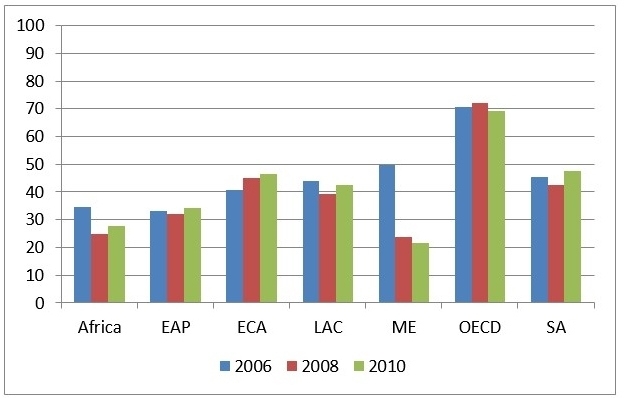
On the 22nd and 23rd November 2012, CABRI and the International Budget Partnership (IBP) held a workshop in Ghana on fiscal transparency and participation. The workshop served to launch a three-year programme, which will aim to work with up to four participating CABRI countries to undertake joint reviews of transparency and participation.
The discussion on how to improve fiscal transparency was taken up by participants from Ministries of Finance as well as civil society representatives from Liberia, Kenya, Ghana, Central African Republic, Mali and South Africa. The workshop served to present and discuss the findings of the recent CABRI publication, entitled Fiscal Transparency and Participation in Africa. Guidelines and standards for budget and fiscal transparency and participation were also discussed and timelines and teams for the peer supported country reviews were identified.
The joint review of country transparency programmes will take place in a phased approach. The first two countries will be reviewed in 2013. The Central African Republic, Mali and the Democratic Republic of Congo will participate in the francophone review and South Africa and Liberia will be reviewing the Kenyan participation reforms and transparency systems. The results of the reviews will be discussed and shared within the broader CABRI network.
The report analyses the status and progress made with respect to fiscal transparency and participation in Africa, primarily based on the Open Budget Index (OBI) and Public Expenditure and Financial Accountability (PEFA) scores since 2005. The report found that while on average, African countries are less open about their fiscal activities than their counterparts in other regions of the world (see chart, which plots OBI scores for 2006-2010), there is a wide disparity in country performance within the continent

Despite the fact that countries in Africa provide no or meagre information, in many cases, information is already available internally, and significant progress can be made relatively quickly by focusing on transparency reforms that produce standard external documents. Some countries, such as Egypt, Uganda and Angola, made significant improvements in transparency over the six years covered by the OBI survey. In many countries, improvements are however often not stable over time.
The report also found that the administrative heritage of a given country is a better predictor of fiscal transparency performance than income group. The status of the country with respect to whether it exports natural resources and its ‘fragile state’ status are also significant factors.
African countries fare poorly in respect of transparency on three types of non-core fiscal data, namely donor funds, extra-budgetary activities and contingent liabilities. Africa trails other regions with regard to the provision of non-financial information, but has made progress over the last six years in the provision and quality of performance information.
Average country performance in Africa has deteriorated with regard to the provision of medium-term estimates and in-year actual expenditure, and improved with regard to the provision of past years’ information and budget year estimates. And while there have been improvements in the usefulness and comprehensiveness of data, on average, the provision of information has been less timely from 2006 to 2010.
Audit systems in Francophone and Lusophone countries lag behind systems in Anglophone countries. In some countries, audit systems are in fact functioning well but the public does not have access to audit reports.
African countries assessed in all three rounds of the PEFA have made progress in terms of legislature engagement strength between 2006 and 2010. Anglophone countries appear to have more effective legislative budgetary institutions.
Between 2006 and 2010, while Anglophone countries have made progress in terms of opportunities for citizens to engage in the budget process, on average, these opportunities diminished in Francophone countries.
The discussions enabled to delve deeper into identified issues in the report, including that of capacity, both technical and financial, and that of the lack of communication of legal avenues for transparency. The importance to promote standards and the culture of transparency was identified, as well as the need to prioritise reforms depending on the country context.
The need to further institutionalise the role of civil society in the budget process and empower civil society to participate more actively in the budget process was also discussed. Avenues to engage civil society were identified, such as organising forums for civil society or publishing citizen’s guide to the budget.